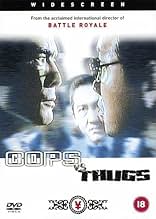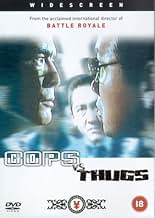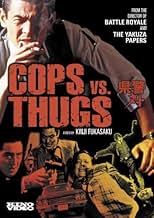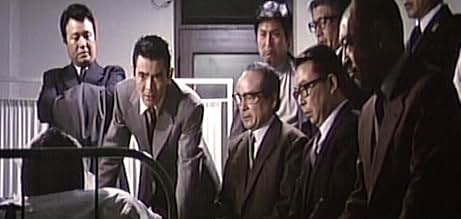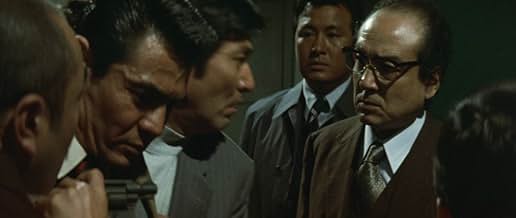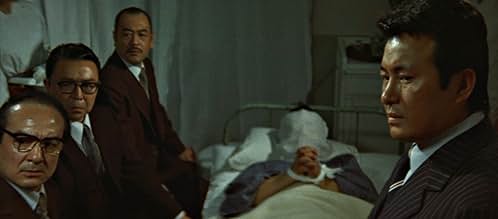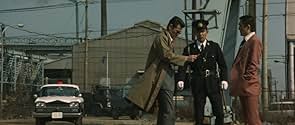NOTE IMDb
7,2/10
1 k
MA NOTE
Ajouter une intrigue dans votre langueActing boss Hirotani of the Ohara gang uses his friendship with corrupt cop Kuno to usurp a staged land deal that rival yakuza gang Kawade had arranged through local politicians. Open warfar... Tout lireActing boss Hirotani of the Ohara gang uses his friendship with corrupt cop Kuno to usurp a staged land deal that rival yakuza gang Kawade had arranged through local politicians. Open warfare erupts between the two gangs.Acting boss Hirotani of the Ohara gang uses his friendship with corrupt cop Kuno to usurp a staged land deal that rival yakuza gang Kawade had arranged through local politicians. Open warfare erupts between the two gangs.
- Réalisation
- Scénario
- Casting principal
- Récompenses
- 2 victoires au total
Avis à la une
The acclaimed director Kinji Fukasaku most recognized on Yakusa pictures since late sixties in a successive thematic offerings, he kept on the track in Cops vs Thugs, freely based in real events in Japan just changing names and the city where this facts really happened, the plot sets place in a seashore city where two opposites Yakusa clans struggle for large brownfield land thru a corrupt cop among a greedy politicians in a prearranged fake public auction.
To make a proper reading about the picture setting, we must backdate in post WWII when the all Japanese people have struggle to survived in hard poverty era due the Japan was devasted and all economy in ruins whereby all citizen had to appeal to black market to buy the essential foods that disappeared from the sight carried out by the war's efforts, so such dishonest Detective Kuni (Bunta Sugawara) and his mate Yakusa's Boss Kenji Hirotani (Hiroki Matsukata) were raised in those hard times, so it was rather usually they bribery each other.
When reaches at Police institution a newest generation as Lt. Kaida (Tatsuo Umemia) whom never gone hungry and was duly studied in new peaceful environment on fifties it somehow triggers a clash between two opposites generations, as the master Fukasaku implied in early scenes Hirotani as Yakusa's chief sitting in a chair at precinct, worst answering the phone as one of the policemen, in other hand Det. Kuno harshly beating up on smallest criminals at street, it exposes that all them are in equal terms, due they were a product of its own harsh era, masterfully directed upon this point of view.
Thanks for reading.
Resume:
First watch: 2025 / How many: 1 / Source: DVD / Rating: 8.
To make a proper reading about the picture setting, we must backdate in post WWII when the all Japanese people have struggle to survived in hard poverty era due the Japan was devasted and all economy in ruins whereby all citizen had to appeal to black market to buy the essential foods that disappeared from the sight carried out by the war's efforts, so such dishonest Detective Kuni (Bunta Sugawara) and his mate Yakusa's Boss Kenji Hirotani (Hiroki Matsukata) were raised in those hard times, so it was rather usually they bribery each other.
When reaches at Police institution a newest generation as Lt. Kaida (Tatsuo Umemia) whom never gone hungry and was duly studied in new peaceful environment on fifties it somehow triggers a clash between two opposites generations, as the master Fukasaku implied in early scenes Hirotani as Yakusa's chief sitting in a chair at precinct, worst answering the phone as one of the policemen, in other hand Det. Kuno harshly beating up on smallest criminals at street, it exposes that all them are in equal terms, due they were a product of its own harsh era, masterfully directed upon this point of view.
Thanks for reading.
Resume:
First watch: 2025 / How many: 1 / Source: DVD / Rating: 8.
There's lots going on here in addition to the sex and violence that you'd expect. It's harsh, and deals with codes and honour in interesting ways. Think of it like a Japanese Scorcese picture and you'll get it. Works well.
This probably deserves a second viewing because I lost the drift a couple of times and found myself confusing the goodies and the baddies. I'm sure this is partly the director's intention, but probably not to the extent I lost it for a while. Never mind this really moves along and the confusion surrounding the participants and the minimal plot matters little. Great cinematic style with much variety, even use of black and white for flash backs and freeze frame for emphasis. Rousing score inspired by blaxploitation movies and a welcome and strong performance from the great Reiko Ike. Sex and violence, some debate about whether the cops or the yakuza are the good guys and then some more sex and violence. Very good but I'm sure I'll enjoy it even more another time.
The film is the Japanese answer to American mafia movies.
The director Kinji Fukasaku also knowed for his recent successfull movie "Battle Royale", began his carrer with Yakuza's movies being the most representative director of the genre and considered like the master of this kind of films, inspiring well-known authors like Kitano and Miike. In "cops vs thugs" he breaks the thin border between cop and thugs and mix them in a violent and corrupted world, being difficult to know who is the good or bad guy. Perhaps because everyone have two faces.
The actors play a good performance and the main character plays a superb role struggling between the law and common sense, he alone against the world like inspector Harry Callahan, but the humanity of the character consist in his doubts.
The plot of the movie isn't very original, landscape speculation, but for the movie don't have any importance. Also the music inspired in American movies of seventies give more dinamism to action scenes.
In conclusion a good movie highly recommended to genre fans, where no one is free of guilty, that can be summarize with a line from the script: "Gangsters and cops are the same. They both respect codes and laws."
8/10
The director Kinji Fukasaku also knowed for his recent successfull movie "Battle Royale", began his carrer with Yakuza's movies being the most representative director of the genre and considered like the master of this kind of films, inspiring well-known authors like Kitano and Miike. In "cops vs thugs" he breaks the thin border between cop and thugs and mix them in a violent and corrupted world, being difficult to know who is the good or bad guy. Perhaps because everyone have two faces.
The actors play a good performance and the main character plays a superb role struggling between the law and common sense, he alone against the world like inspector Harry Callahan, but the humanity of the character consist in his doubts.
The plot of the movie isn't very original, landscape speculation, but for the movie don't have any importance. Also the music inspired in American movies of seventies give more dinamism to action scenes.
In conclusion a good movie highly recommended to genre fans, where no one is free of guilty, that can be summarize with a line from the script: "Gangsters and cops are the same. They both respect codes and laws."
8/10
COPS VS. THUGS is a Japanese yakuza movie directed by Kinji Fukasaku, and it shares themes and stylistic trademarks with his more celebrated yakuza films, SYMPATHY FOR THE UNDERDOG, GRAVEYARD OF HONOR, STREET MOBSTER, and the five-film series, THE YAKUZA PAPERS. The big difference here, as indicated by the title, is that the protagonist is not actually a mobster, but a tough cop who has to ride herd on the yakuza in his town. He is seen roughing up and disarming a quartet of yakuza henchmen in the opening pre-credits scene, thus establishing his tough guy credentials. Detective Kuno is played by veteran yakuza star Bunta Sugawara and we soon learn that, despite his fearlessness, the character is very much in the pocket of a local yakuza gang, having shielded one of its bosses from a murder charge six years before the events depicted here (reportedly based on a true story). So it's very much a yakuza film in the spirit of Fukasaku's other genre outings. Like them, it's got short sharp bursts of bloody, messy action—shootouts, stabbings, raids on rival turf, beatings of suspects, etc.--all handled in chaotic fashion, just like real-life violence. You won't find fancy fight choreography here or cleanly staged shootout sequences with montage editing. We get lots of long, unbroken takes and, during action scenes, some hand-held camera and zoom shots.
The backdrop for the events on screen is a land auction which the rival gangs are both hoping to manipulate to their benefit. But the real story involves the big monkey wrench that's thrown into Kuno's operation when Detective Kaida (Tatsuo Umemiya), a young crusading officer with judo skills and a college degree, takes over the squad to clean up the city and root out the yakuza. This puts Kuno in quite a bind. In an American cop thriller, Detective Kaida would be the protagonist and Kuno would be the villain. But it's clear that Fukasaku's sympathies lie with Kuno, who recalls starving after the war when the cops took all the black market rice for themselves and he resolved to grow up to be a "snatcher" himself. The cops in this town have figured out how to co-exist with the yakuza, tamping down their excesses and using designated scapegoats to serve prison sentences while allowing business-as-usual to continue. It's as if Sidney Lumet's film, SERPICO (1973), about whistle-blowing NYPD cop Frank Serpico, had been remade from the point-of-view of one of the corrupt cops, with Serpico as an antagonist. (Come to think of it, Lumet's 1981 follow-up, PRINCE OF THE CITY, is actually closer in spirit to Fukasaku's film than to SERPICO.) Fukasaku often spoke in interviews of the damage the war did to people's psyches and moral behavior and his films often addressed these issues. His last film, BATTLE ROYALE (2000), was a direct response to the way his generation of young people—teenagers during the war--was treated by the military dictatorship.
There are a number of women characters but their parts are all brief and they're basically just sex objects or floor mats to be walked on by the men. Reiko Ike, the sexy star of SEX AND FURY and FEMALE YAKUZA TALE, has a small role as a compliant gang moll assigned to Kuno to keep him company while he's separated from his wife.
COPS VS. THUGS was made in 1975 but is set in 1963. There doesn't seem to be much of an effort to recreate period detail. The cars and the fashions all seem to be from the 1970s. There is a scene where a black-and-white TV is on in an apartment and a singer is shown performing a sentimental ballad which is heard on the soundtrack as an attacker with a knife breaks in and stabs one of the occupants. The song sounds to me like it could indeed have been a popular hit in the early '60s. I wish I knew what the title is and who is singing it on TV in the scene.
I like the ending of this film, in which Kuno has to finally take some decisive action, even though it tears him apart to do so. There's an interesting postscript too, with an inevitable twist. However, I never felt much sympathy for Kuno. By any objective standard, he's a bad guy, a corrupt cop who stands in the way of good cops trying to do their job. One can make all kinds of allowances for him, given the explicit social and cultural contexts so ably supplied by Fukasaku, but that doesn't make me like this guy or feel he can be redeemed. Still, one has to give credit to Fukasaku for trying to challenge our assumptions. He never makes it easy for us.
The backdrop for the events on screen is a land auction which the rival gangs are both hoping to manipulate to their benefit. But the real story involves the big monkey wrench that's thrown into Kuno's operation when Detective Kaida (Tatsuo Umemiya), a young crusading officer with judo skills and a college degree, takes over the squad to clean up the city and root out the yakuza. This puts Kuno in quite a bind. In an American cop thriller, Detective Kaida would be the protagonist and Kuno would be the villain. But it's clear that Fukasaku's sympathies lie with Kuno, who recalls starving after the war when the cops took all the black market rice for themselves and he resolved to grow up to be a "snatcher" himself. The cops in this town have figured out how to co-exist with the yakuza, tamping down their excesses and using designated scapegoats to serve prison sentences while allowing business-as-usual to continue. It's as if Sidney Lumet's film, SERPICO (1973), about whistle-blowing NYPD cop Frank Serpico, had been remade from the point-of-view of one of the corrupt cops, with Serpico as an antagonist. (Come to think of it, Lumet's 1981 follow-up, PRINCE OF THE CITY, is actually closer in spirit to Fukasaku's film than to SERPICO.) Fukasaku often spoke in interviews of the damage the war did to people's psyches and moral behavior and his films often addressed these issues. His last film, BATTLE ROYALE (2000), was a direct response to the way his generation of young people—teenagers during the war--was treated by the military dictatorship.
There are a number of women characters but their parts are all brief and they're basically just sex objects or floor mats to be walked on by the men. Reiko Ike, the sexy star of SEX AND FURY and FEMALE YAKUZA TALE, has a small role as a compliant gang moll assigned to Kuno to keep him company while he's separated from his wife.
COPS VS. THUGS was made in 1975 but is set in 1963. There doesn't seem to be much of an effort to recreate period detail. The cars and the fashions all seem to be from the 1970s. There is a scene where a black-and-white TV is on in an apartment and a singer is shown performing a sentimental ballad which is heard on the soundtrack as an attacker with a knife breaks in and stabs one of the occupants. The song sounds to me like it could indeed have been a popular hit in the early '60s. I wish I knew what the title is and who is singing it on TV in the scene.
I like the ending of this film, in which Kuno has to finally take some decisive action, even though it tears him apart to do so. There's an interesting postscript too, with an inevitable twist. However, I never felt much sympathy for Kuno. By any objective standard, he's a bad guy, a corrupt cop who stands in the way of good cops trying to do their job. One can make all kinds of allowances for him, given the explicit social and cultural contexts so ably supplied by Fukasaku, but that doesn't make me like this guy or feel he can be redeemed. Still, one has to give credit to Fukasaku for trying to challenge our assumptions. He never makes it easy for us.
Le saviez-vous
- AnecdotesPresident of Toei Okada Yusuke came up with the title of the film while on the toilet.
- Crédits fousOpening credits play over exposition explaining the current state of the yakuza within the city and their history.
- ConnexionsFeatured in Beyond the Film: Cops vs Thugs (2017)
Meilleurs choix
Connectez-vous pour évaluer et suivre la liste de favoris afin de recevoir des recommandations personnalisées
Détails
- Durée1 heure 40 minutes
- Mixage
- Rapport de forme
- 2.35 : 1
Contribuer à cette page
Suggérer une modification ou ajouter du contenu manquant

Lacune principale
What is the Spanish language plot outline for Police contre syndicat du crime (1975)?
Répondre
